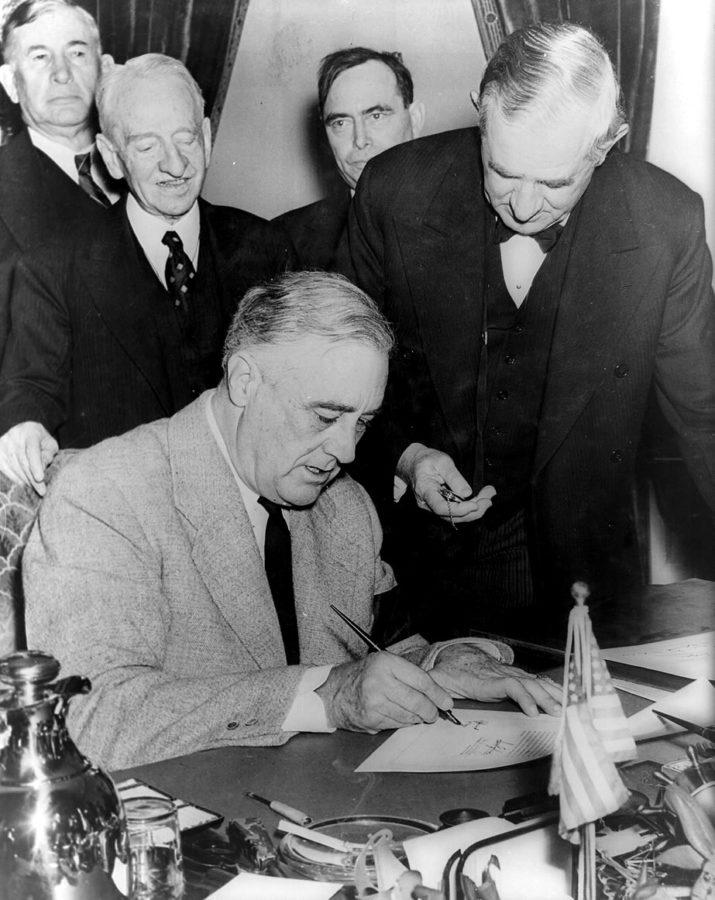Glawe: Rockefeller Democrats and a Paradise Lost
April 17, 2013
For the last two weeks, I’ve written columns about how to “fix” the Grand Old Party. Now I’m going to spend my “word limit” expounding upon something truly personal (and more challenging) — the problems of my political party. In some respects, attempting to change your own political party forces you to examine your own faults. This column is somewhat of a reflection of my own political character and the sum of all the hope I have for the future of politics.
The opening lines of Paul Krugman’s book “The Conscience of a Liberal” whiffs of nostalgia for the post-New Deal “Middle Class America”: “It’s only in retrospect that the political and economic environment of my youth stands revealed as a paradise lost, an exceptional episode in our nation’s history.”
I wasn’t born into this era. Unfortunately, I was born in the early 1990’s, so I don’t have any experience with the old Roosevelt Democrats or recollections of their momentous attempts to eliminate social and economic inequality in America. However, by the time I was old enough to understand politics, I knew something had gone awry.
With years came exposure to modern politics, and I found that my suspicions were confirmed. Since that great era, Krugman’s “paradise lost,” we’ve seen a rightward shift in the political spectrum. Modern Democrats are similar to old moderate Republicans, and modern Republicans are just really far to the right.
The intentions behind my last two columns, contrary to many of my critics, was not to “liberalize” the GOP, but to bring it back from the fringes of desolation. Even more so, Republicans need to take back their party so Democrats can stop playing the role of the Rockefeller Republicans and go back to being Roosevelt Democrats.
Right now, the Democrats are chained to an anchor, and that anchor is a hyperpolarized-opposition party that is dragging the political spectrum in the wrong direction.
But it wouldn’t be fair of me to place all of the blame on the GOP. There are problems in my party as well, but fixing these problems proves a greater challenge for myself than fixing the Republican Party (I really had to bite my tongue writing those other two columns). After all, finding a prescription of change for oneself is much more difficult than playing doctor for another.
The problems for Democrats lie within their framework of communication (and when I say “their,” I include myself). Democrats utilize emotions and personal stories to shed light upon the growing disparities and problems in our country, which I believe is a good way to provide perspective on policy issues.
But this has its limits. Liberals also need to explain the complexities of their policies. For instance, spending on stimulus packages during a recession reduces unemployment, but it’s so counterintuitive (and, indeed, it isn’t something easily understood without focusing one’s study on complex economic models) that it’s easy to market against.
In response, Republicans simply say, “Well, we can’t spend beyond our means” and “raising taxes on the rich is class warfare.” None of these are necessarily true, but what does a complacent electorate know about tax policy other than the fact that they hate paying taxes?
The “attitude” of the Democrats on some of these matters, on which we have so much research and data, should be, “We have credible evidence. You don’t. End of discussion.” I mean this with all seriousness. It’s rather an odd thought (and somewhat arrogant and divisive), but Democrats need to stop compromising with Republicans on factual matters. President Barack Obama needs to stop caving to the GOP (they have gotten their way time and time again).
For example, concerning healthcare reform, the Democrats should have begun the debate presenting a single-payer healthcare plan (or, at least, a public option). The Republicans would obviously reject their plan, but that’d leave room to compromise in the “middle.” Instead, we have “Obamacare,” which is more to the right than Nixon’s healthcare proposal (Nixon’s plan mandated companies to buy insurance, Obama’s plan mandates individuals).
Though, in Obama’s defense, maybe America isn’t quite ready for single-payer.
If the Democrats keep allowing this anchor to pull the political spectrum in the wrong direction, we may no longer have a party for the “little guy.” What, after all, has happened to the powers of organized labor? Financial regulations? Single-payer healthcare? Income equality?
I, like Krugman, feel abandoned by my party (where did “Middle-Class America” go?). Though we have made great strides in healthcare and same-sex marriage, we have much more to do. As of now, we have lost sight of Paradise.
When we’ve freed ourselves from the chains of the neo-republican anchor, we will once again discover that long lost paradise and finally breathe a sigh of relief. For now, though, I’ll just inhale the nostalgia.
Michael Glawe is a junior in mathematics and economics from New Ulm, Minn.







